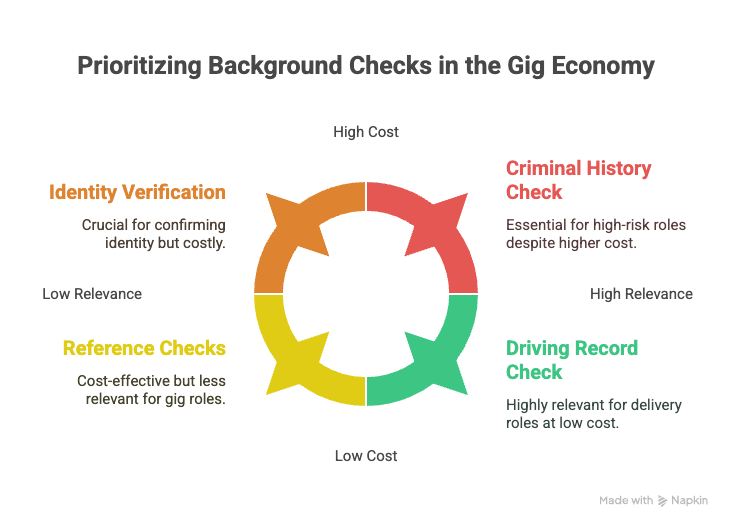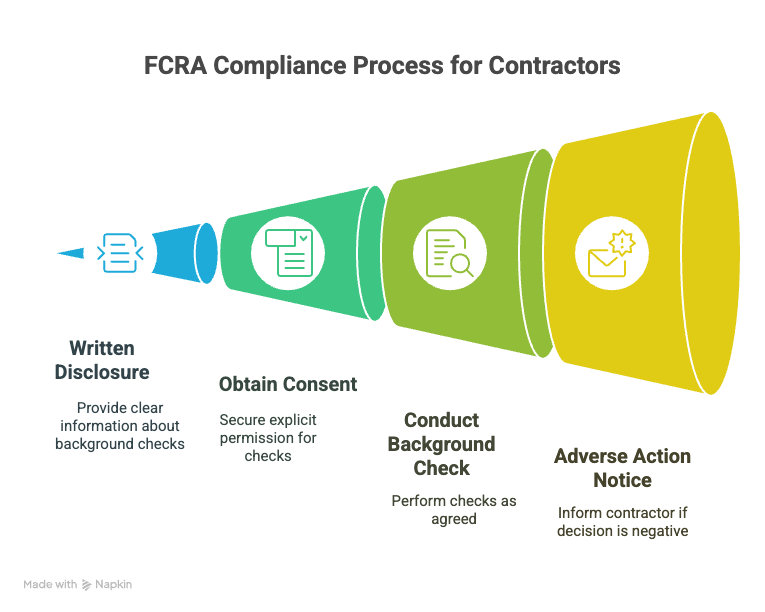The gig economy is reshaping how we work, offering flexibility for workers and agility for employers. However, this dynamic work arrangement brings unique challenges to the traditional staffing screening process. If you're an employer navigating the vibrant but complex world of gig work, understanding the nuances of background checks, legal considerations, and technological advancements is crucial.
This guide provides an in-depth look at how the gig economy influences staffing screening. From new compliance requirements to innovative technology solutions, we're here to demystify the process and help you adapt effectively.
Key Takeaways
- The gig economy represents a major shift in the labor market with more people opting for temporary, flexible work arrangements.
- Background checks are critical in this landscape to ensure the safety and reliability of temporary workers.
- The Fair Credit Reporting Act (FCRA) applies to gig workers as well as permanent employees, requiring compliance in how background checks are conducted.
- Continuous monitoring offers an ongoing approach to maintaining safety standards with gig workers, though it can raise privacy concerns.
- API integrations can streamline the background check process, saving time and improving accuracy for staffing agencies managing gig workers.
Introduction
The gig economy isn't just a buzzword; it's a seismic shift in how people work. With millions of Americans now freelancing or contracting, it's clear this isn't a passing trend. Gig workers are everywhere, from ride-share drivers to freelance graphic designers, all seeking flexibility. This rise has massive implications for employers. Background checks, long a staple of traditional hiring, are now crucial in this new landscape.
In the gig economy, the importance of background checks cannot be understated. For employers, ensuring trust and reliability in temporary workers is essential, especially when they lack long-term engagement. Background checks serve as a key tool to safeguard businesses, verifying identity and history swiftly to match the fast-paced hiring needs.
This guide zeros in on the gig economy's impact on staffing screening. It digs into the unique challenges this work model presents and explores practical solutions. From updated compliance requirements to cutting-edge tech solutions, what you’ll find here is a straightforward roadmap to navigate these new waters. Whether you're an HR professional or a business owner, understanding these dynamics is crucial for effective staffing in today's gig economy.
EXPERT INSIGHT: The gig economy has shed light on the truth that trust is a fragile and critical thing. For traditional jobs, a person has months or years to build it up; with gigs, it has to begin with day one and is based purely on a profile and a handshake. That is why background checks matter—less to prevent chances from being closed off but to open them up with responsibility. Carried out with care and attention, these help to protect workers and employers and create a culture of flexibility, yet with responsibility. It is all about protecting people while opening up chances at the same time. - Charm Paz, CHRP
The Gig Economy: A Brief Overview
The gig economy is a labor market characterized by short-term contracts or freelance work as opposed to permanent jobs. It includes freelancers, independent contractors, part-time workers, and temporary positions filled through online platforms. Popular services like Uber, Lyft, and TaskRabbit are prime examples.
This segment of the workforce is expanding rapidly. According to the Bureau of Labor Statistics, gig workers make up a substantial portion of the U.S. labor force, with millions participating in some form of gig work. The growth is driven by the lure of flexibility and autonomy.
In stark contrast to traditional employment, gig work often lacks benefits such as health insurance and pension plans. It offers flexibility but at the cost of stability. Workers can choose their hours and projects, but they must also shoulder any gaps in income and lack of job security.
Understanding these differences is crucial when considering background checks for gig workers. The transient nature of this employment type requires different approaches to screening compared to traditional roles. As an employer, you need to adapt to these changes in how the workforce is structured to ensure compliance and security in your hiring processes.
Importance of Background Checks in the Gig Economy
Background checks are vital in the gig economy, just as they are in traditional employment. While gig workers might be temporary, the need to ensure safety and reliability remains constant. As an employer, you need to protect your company from potential risks. A background check helps vet candidates for fraud, liability issues, and any possible security threats.
Consider a scenario where you hire a delivery driver through a gig platform. Without a proper background check, you might unknowingly hire someone with a history of unsafe driving. This could lead to legal headaches for your business. Checking the driver's history helps you make informed decisions, minimizing potential problems.

There are various types of checks that can be applied to gig roles. Criminal history checks give insight into any past legal issues. Identity verification helps confirm that the person is who they claim to be. References can provide firsthand accounts of a worker's reliability and skills.
Think about how these checks can fit into your hiring process. Which ones are most relevant for the role you are filling? By tailoring your approach, you ensure safety without overstepping. Investing in background checks for gig workers isn’t just a formality; it’s a smart business decision.
Legal Considerations: FCRA for Independent Contractors
The Fair Credit Reporting Act (FCRA) is a federal law governing how background checks are conducted in the United States. It's critical to understand its implications, especially when dealing with independent contractors in the gig economy. The FCRA mandates that employers must get written consent from candidates before conducting background checks. It also requires giving candidates a copy of their report and a notice of their rights if adverse action is taken based on the report.
You might think the FCRA only applies to permanent employees, but that's a misconception. Independent contractors also fall under its purview. If you're hiring a freelancer or a gig worker and plan to conduct a background check, compliance is not optional—it's a legal requirement. Businesses must handle this process diligently to avoid hefty fines and legal issues.

To stay compliant, ensure you provide clear, written disclosures to gig workers about the checks you plan to conduct. Obtain their explicit, written permission. If a report results in an adverse decision, like not hiring, you must inform the individual with the required documentation. Are you confident your current process aligns with these FCRA requirements? Regularly review it to catch oversights before they become liabilities.
Continuous Monitoring: A Necessity for Gig Workers
Continuous monitoring in employment screening is the practice of regularly updating background checks after initial hiring. For gig workers, this means keeping tabs on their records continually. It serves as an essential tool for maintaining workplace safety and integrity, ensuring that workers remain compliant and trustworthy.
The benefits of continuous monitoring are clear. It helps you spot potential red flags that may arise after hiring. For instance, new criminal activity or adverse financial changes can be detected, allowing businesses to act before these issues affect their operations. This proactive approach not only safeguards company assets but also protects clients and other employees.
That said, implementing continuous monitoring isn't without its challenges. Privacy concerns are a major hurdle. Workers might feel that ongoing checks invade their personal lives. To address this, transparency is key. Clearly communicate how data will be used and obtain explicit consent from all gig workers involved.
Cost can be another barrier. Regular checks do mean additional expenses. But consider this an investment in risk management. The cost of dealing with threats after they occur often surpasses the cost of prevention.
Technology can help mitigate these hurdles by automating parts of the process, thus reducing costs and increasing efficiency. Collaborating with reputable screening providers ensures that your monitoring practices remain compliant with privacy laws and industry standards.
Are your current screening practices equipped to handle the fluid nature of gig work? Continuous monitoring could be the solution.
Staffing Agency API Integrations: Streamlining the Screening Process
Technology has transformed background screening, making it faster and more accurate. For staffing agencies managing gig workers, API integrations are game-changers. APIs, or Application Programming Interfaces, allow different software systems to communicate with each other. This can drastically reduce the time and effort needed for background checks.
Integrating APIs into your screening process helps handle the high turnover common in gig work. APIs can connect your systems with background check providers, pulling and updating data automatically. This streamlines operations and reduces manual input errors, saving your team valuable hours that can be spent on other important tasks.
Consider a scenario where a staffing agency manages several hundred gig workers weekly. Without APIs, checking each worker's background manually could take days. With an API integration, the whole process can be automated, reducing it to mere minutes and ensuring compliance with legal requirements in real-time.
APIs not only speed up the process but also improve accuracy. Data exchange between systems is seamless, minimizing the risk of outdated or incorrect information. This gives you more confidence in the reliability of the checks you perform.
Implementing API integrations does have challenges. You need to ensure that your systems are compatible and that any new processes conform to privacy standards. However, the benefits in efficiency, accuracy, and compliance often outweigh these obstacles.
If you haven’t yet considered API integrations for your staffing agency, it might be time to reevaluate. They offer a route to scale your operations effectively without sacrificing precision or compliance.
Future Trends in Gig Economy Screening
AI and blockchain are on the rise in background screening. AI can quickly analyze vast amounts of data, uncovering patterns and anomalies that may indicate risk. This efficiency speeds up the screening process, providing almost instant results while maintaining accuracy. Blockchain offers security and transparency. Its decentralized nature ensures that data is tamper-proof, which is crucial for maintaining trust in sensitive background check information.
Expect new laws to emerge. With the gig workforce growing, regulations will likely evolve to address its unique challenges. Existing frameworks may need adjustments to ensure fair treatment and privacy for gig workers. Keeping tabs on legal changes is important. Staying informed will help you ensure compliance and avoid legal pitfalls.
Be prepared to adapt. The rapid changes in technology and law mean you should be ready to modify your processes. Review how you currently conduct screenings. Are there efficiencies that AI or blockchain could bring? Do your methods align with the latest legal requirements? Regular audits of your screening approach can keep your business agile and compliant.
Conclusion
The gig economy demands a fresh approach to background screening. As an employer, adapting to these changes means ensuring your screening practices align with the unique challenges and opportunities that gig work presents. Scrutinize your current methods and seek areas for advancement. Consider implementing technology solutions that streamline efficiency and maintain compliance with evolving regulations. Innovate and remain compliant to not only keep pace but thrive amid the dynamic world of gig work.
Additional Resources
When navigating the complexities of the gig economy, leveraging reliable resources is essential. Explore our blog where we cover in-depth topics like best practices for background checks and emerging trends in staffing. For authoritative advice on hiring practices and legal compliance, visit the Department of Labor. These resources can help you stay informed and compliant in your screening processes.
Frequently Asked Questions (FAQs)
Do gig workers need the same background checks as employees?
Gig workers don’t always require the same level of background screening as full-time employees. The checks depend on the role and the regulations of the specific industry. While some roles might not need detailed checks, others, especially those involving sensitive information or vulnerable groups, may require thorough screening.
How fast can staffing agencies screen gig workers?
Staffing agencies can often complete background checks on gig workers in a few days. Some services even offer expedited options for quicker results. Technology and access to databases play a significant role in speeding up this process.
Who pays for gig worker background checks?
The cost of background checks for gig workers often falls on the hiring company. However, some gig platforms might pass this cost onto the workers themselves. Knowing the policy of your specific platform or company is essential.
Can you run continuous checks on freelancers?
Yes, continuous background checks are an option for freelancers. This practice ensures ongoing compliance and safety, especially important in roles with evolving responsibilities or access to sensitive information.
What are the penalties for misclassifying gig workers during screening?
Penalties for misclassifying gig workers can include fines, back taxes, and legal action. Misclassification might occur if a gig worker is improperly treated as an independent contractor instead of an employee. Proper classification helps avoid these complications.
What industries commonly require background checks for gig workers?
Industries like healthcare, finance, and education often require background checks, even for gig workers. They handle sensitive information and work in environments requiring trust and safety.
Can a gig worker dispute a background check result?
Yes, gig workers have the right to dispute inaccurate information in their background check. It's crucial to communicate promptly with the screening agency to rectify errors and ensure fair evaluation.
How can gig workers prepare for a background check?
To prepare for a background check, ensure your records are accurate and up to date. Gather your employment history, education certificates, and any relevant documents. Being transparent with potential employers can also help mitigate concerns.
Are there privacy concerns with gig worker screenings?
Yes, privacy concerns are significant when it comes to background checks. Reputable agencies follow legal standards to protect personal data. Understanding the process and ensuring consent is vital for maintaining privacy rights.
Definitions
Gig Worker
A gig worker performs short-term, project-based, or freelance work, often facilitated through online platforms. They are not typically considered employees and usually don’t receive benefits like health insurance or retirement plans. Think of ride-share drivers, freelance writers, or on-demand delivery personnel. These roles prioritize flexibility but lack long-term job security.
Background Check
A background check is a process employers use to verify a person’s identity, criminal record, employment history, or other relevant information. This helps determine whether someone is suitable for a role. For example, running a motor vehicle report on a delivery driver can help you avoid hiring someone with serious driving violations.
Independent Contractor
An independent contractor provides services under a contract but operates as a separate business. Unlike regular employees, they handle their taxes, choose their hours, and often use their tools. Many gig workers fall into this category. It’s important to classify them correctly to stay compliant with labor laws.
FCRA (Fair Credit Reporting Act)
The FCRA is a U.S. law that regulates how employers use background checks for hiring. It applies to all types of workers, including independent contractors. Under this law, you must get written permission before checking someone's background and give notice if the results affect hiring decisions. Failing to follow these steps can result in legal penalties.
Continuous Monitoring
Continuous monitoring is the ongoing review of an individual’s background after they’re hired. It’s used to spot new issues like recent criminal activity or license suspensions. It’s especially useful for employers working with gig workers, who may come and go frequently. This can help you spot problems early and make timely decisions.
References
- Gig Economy Background Checks: Challenges & Solutions 2025 (CredentialBS)
- Gig Economy Statistics and Market Takeaways for 2025 (Upwork)
- 2025 Global Trends Report: Speed and Compliance on Top (First Advantage)
- Efficient Background Screening In the Gig Economy (S2Verify)

GCheck Editorial Team
Meet the GCheck Editorial Team, your trusted source for insightful and up-to-date information in the world of employment background checks. Committed to delivering the latest trends, best practices, and industry insights, our team is dedicated to keeping you informed.
With a passion for ensuring accuracy, compliance, and efficiency in background screening, we are your go-to experts in the field. Stay tuned for our comprehensive articles, guides, and analysis, designed to empower businesses and individuals with the knowledge they need to make informed decisions.
At GCheck, we're here to guide you through the complexities of background checks, every step of the way.






